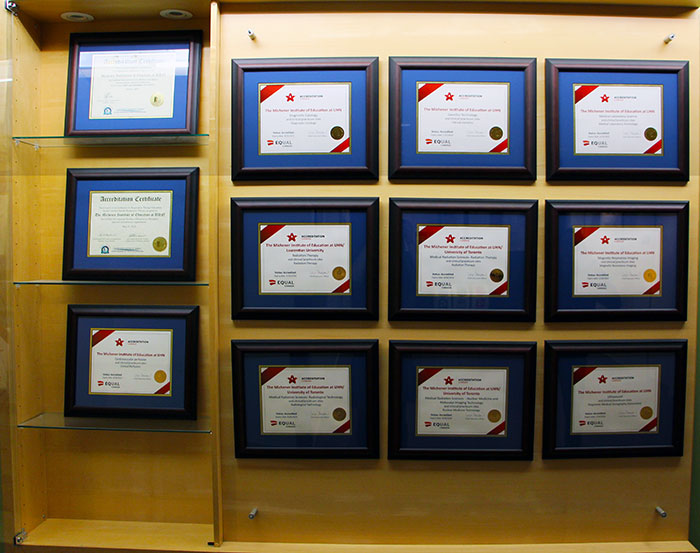
Part of what makes The Michener Institute of Education at UHN a recognized leader in applied health sciences education is that the majority of the school’s programs are accredited. While proving our academic excellence plays a large role in achieving accreditation status, there is considerable operational support happening behind the scenes to support the accreditation process.
Accreditation serves as a form of quality assurance under which the services and operations of health education programs are evaluated to determine whether specific standards are being met. Within Ontario, Michener is the only accredited provider for some fields such as Cardiovascular Perfusion, Genetics Technology and Diagnostic Cytology.
Each program generally undergoes the accreditation cycle once every six years, which requires the presentation of documents, reports and evidence, tours of the facilities and labs connected to the program, as well as interviews with program leadership, clinical managers, faculty, students and graduates. Coordination between many departments is fundamental to a successful accreditation review.
This past January, the joint Michener/University of Toronto Medical Radiation Sciences (MRS) program received full accreditation for all three streams, meeting every single criterion within each of the five requirements.
This tremendous result could not have been achieved without the ongoing support and hard work of all in the program, especially the ongoing dedication of program faculty over the past six years since the last accreditation visit.
This did not go unnoticed by the accreditation review teams, who had many wonderful things to say about the strong bond and relationship that clinical partners have with the program, as well as the dedication from Michener’s students.
For the Centre for Academic Quality (CAQ), preparation for accreditation review starts as early as one year in advance.
“Our department works with other departments to support programs in compiling their accreditation submission,” says Nikolina Petranovic, Process Coordinator in CAQ. “We guide them in terms of providing evidence to showcase why we excel at teaching our students and how they are able to obtain their competencies and graduate as really great health care professionals.”
Nikolina’s role involves drafting the self-assessment report, collecting and organizing program and institutional evidence, collaborating with the administrative assistants who provide support with documentation and organizing the on-site visit schedule.
“We essentially ensure we have the evidence to justify what the program does to attain these standards and present it in a way that the survey team can easily digest and analyze,” says Nikolina.
While accreditation has been part of CAQ’s portfolio for the past decade, other teams are essential to the process as well.
The Joint Occupational Health and Safety Committee (JOHSC) is a provincial Ministry of Labour mandated group consisting of more than 20 Michener employees who ensure the working safety of the premises for staff and students.
“Usually about three or four weeks prior to the visit, I will review the program, familiarize myself with the spaces and schedule a pre-accreditation inspection,” says Roger Webb, Distribution and Receiving Coordinator and JOHSC member.
Within two days of the inspection, the JOHSC will issue a report to everybody in the department being reviewed. A few days later, a second inspection is done with faculty members to assess. Faculty will then address any issues that have been raised.
“I also delegate tasks to Facilities if there are repairs to be made, to Information Management for cable issues, and once that is completed, I do a final walk through with the program Chair and responsible faculty members,” says Roger. “There are a lot of hours put into it, but the fundamental importance of it validates the process for us. Without accreditation, we wouldn’t have the program.”
One of the biggest advantages of having support from internal departments is that it allows faculty the space to allocate more time and energy to delivering a great curriculum.
“It’s a nice way to bridge the gap between our background internal support department and future health care professionals,” says Nikolina.